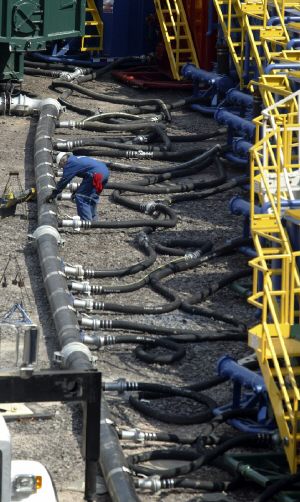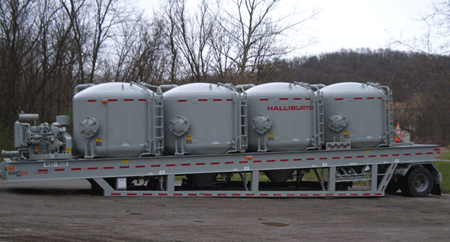Hydro-fracturing
From Wikimarcellus
| Revision as of 19:50, 30 November 2009 Tcopley (Talk | contribs) (The casing is run well below the water table to secure against any leakage) ← Previous diff |
Revision as of 22:32, 6 December 2009 Tcopley (Talk | contribs) (nanotechnology) Next diff → |
||
| Line 11: | Line 11: | ||
| One method of hydro-fracturing is called [[slickwater]]. | One method of hydro-fracturing is called [[slickwater]]. | ||
| - | An approach that can be used to minimize the amount of polluted water trucked out is a [[closed loop system]]. A promising new way of hydro-fracturing gas wells, first introduced in Marcellus shale drilling in September, 2009, is the use of [[GASFRAC Energy Services Inc|Liquefied Petroleum Gas (LPG)]] (propane) in gel form. Using this process there is ''no'' flowback water since LPG is used as the fracturing agent and to transport the proppants into the fractures, and all of the LPG is recaptured back up the well. | + | An approach that can be used to minimize the amount of polluted water trucked out is a [[closed loop system]]. A promising new way of hydro-fracturing gas wells, first introduced in Marcellus shale drilling in September, 2009, is the use of [[GASFRAC Energy Services Inc|Liquefied Petroleum Gas (LPG)]] (propane) in gel form. Using this process there is ''no'' flowback water since LPG is used as the fracturing agent and to transport the proppants into the fractures, and all of the LPG is recaptured back up the well. |
| + | |||
| + | Another new development on the horizon is using [[nanotechnology]] in drilling fluids. | ||
| <center>http://www.sonic.net/~tcopley/img/halliburton_skid_sm.gif <br>'''[[Halliburton]] frac fluid trailer'''<br> left along side highway near the Borough<br>of Houston, Washington County, PA<br>[http://donnan.com/ Photo credit - donnan.com]</center> | <center>http://www.sonic.net/~tcopley/img/halliburton_skid_sm.gif <br>'''[[Halliburton]] frac fluid trailer'''<br> left along side highway near the Borough<br>of Houston, Washington County, PA<br>[http://donnan.com/ Photo credit - donnan.com]</center> | ||
Revision as of 22:32, 6 December 2009
Hydro-fracturing, (aka Hydraulic fracturing) or fracing for short, is the process of injecting water, sand, diesel fuel, and/or a cocktail of chemicals into a well, under high pressure, in order to fracture the shale thereby releasing methane gas trapped in the pores of the rock so it can flow up the pipe. The mixture injected is called fracing fluid. Marcellus shale fracing normaly takes place 7,000 to 10,000 feet underground. Fracing is a time tested procedure for stimulating a well’s productivity that has been in use in oil and gas drilling since the late 1940's.
The fracing fluid itself is pumped in through a network of pipes and equipment that is both highly automated as well as closely watched during all stages of the fracing process. An operator regularly makes fine-tuning adjustments while the procedure is underway in order to optimize gas production.
Hydro-fracturing may be accompanied by acid fracturing and the use of proppants. Also crosslinked guar gel is sometimes used. Generally, field service companies consider the exact recipes they use for preparing drilling fluids to be trade secrets. This includes the chemicals involved. Some of these are believed to be toxic, yet the chemicals are only used in very dilute quantities. Ususally 99.5% of fracing fluid consists of water and sand.

Worker adjusting water line used in hydro-fracturing
a Marcellus well in Dimock Township, Susquehanna County, PA
Courtesy of Michael J. Mullen, Staff Photographer,
Scranton Times-Tribune[1]
While the hydro-fracturing process can use millions of gallons of water for a well, typically a vertical well only uses around 750,000 gallons. A horizontal well with a 4,500 foot lateral averages between 4 to 5 million gallons of water. It also generate quantities of waste water that are of the same order of magnitude. The fluid that comes back up after fracturing a shale well is called flowback water. It includes all of the chemicals pumped in plus both non-toxic and toxic substances that may be present in the shale formation. Water usually must be trucked into and out of a well site.
One method of hydro-fracturing is called slickwater.
An approach that can be used to minimize the amount of polluted water trucked out is a closed loop system. A promising new way of hydro-fracturing gas wells, first introduced in Marcellus shale drilling in September, 2009, is the use of Liquefied Petroleum Gas (LPG) (propane) in gel form. Using this process there is no flowback water since LPG is used as the fracturing agent and to transport the proppants into the fractures, and all of the LPG is recaptured back up the well.
Another new development on the horizon is using nanotechnology in drilling fluids.

Halliburton frac fluid trailer
left along side highway near the Borough
of Houston, Washington County, PA
Photo credit - donnan.com
Many environmentalists have raised concerns about the process of hydro-fracturing shale wells as a potential source of toxic contamination of the water supply. Polluted water has also occasionally leaked from plastic-lined wastewater containment pits or impoundments. Marcellus shale drilling is more or less still in its infancy compared to drilling in other North American shales. To date there have been very few Marcellus water contamination issues with notable exceptions of Dimock and Cross Creek Park. Neither of these were examples of drinking water contamination caused by hydro-fracturing gas wells, but rather resulted from some other issues and were subsequently remedied.
Protecting groundwater is considered by all responsible drillers to be part of their job. Carefully engineered well casings made from multiple layers of steel and special concrete encase the well and maintain an effective barrier between the well bore and surrounding groundwater as it passes through. The casing is run well below the water table to secure against any leakage. Hydro-fracturing takes place thousands of feet below the water table, so the infusion of any contaminated water into the groundwater above would certainly seem to be a very unlikely scenario, if not the rare exception.
The process uses anywhere from 750,000 gallons of water on up to millions of gallons per well which usually must be trucked into drilling sites. The tanker trucks used to bring water in and diesel engines used to power drilling and pumping equipment on the drill site are recognized as a sources of air pollution. There are also concerns about noise-control issues. These relate not only to noise from drilling and pumping equipment, but also from gas compressors which run continuously once the well is actually producing gas.
Resources
Pennsylvania Department of Environmental Protection, Summary of Hydraulic Fracture Solutions-(PDF Format) [2]

